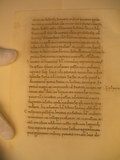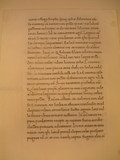Cincinnati Public Library Leaf 39
This leaf comes from a rare manuscript of Livy's History of Rome (completed in about 9 A.D.) copied in Italy in the middle of the fifteenth century. It measures 22.5 x 16 cm and its vellum is very well prepared, though some rubbing of the ink has cast a shadow over the text block of some pages. The Humanistic script is crisp, clear, and without adornment; an exception is the Denison leaf, with its striking initial "H." See Denison University Leaf 39 for more information about this manuscript.
Text: This leaf contains the text of Livy's History, Book 27, Chapters 28-29. The English translation is that of Cyrus Edmonds (1850), via Project Gutenberg.
Reconstruction Note! In Ege's original manuscript, this leaf followed what is now Leaf 39 in the Cleveland Institute of Art portfolio.
 Cincinnati Leaf 39 Recto
Cincinnati Leaf 39 Recto
Cincinnati Public Library Leaf 39 Recto
 Cincinnati Leaf 39 Recto Transcription
Cincinnati Leaf 39 Recto Transcription
ex itinere suspensa humeris, ut inter pacatos, gerentes arma inuadunt, alii e turribus portae murisque saxis sudibus pilis absterrent hostem. ita inde Hannibal suamet ipse fraude captus abiit, profectusque ad Locrorum soluendam obsidionem, qua Cincius summa ui operibus tormentorumque omni genere ex Sicilia aduecto oppugnans. Magoni iam haud ferme fidenti retenturum defensurumque se urbem, prima spes morte nuntiata Marcelli adfulsit. secutus inde nuntius Hannibalem Numidarum equitatu praemisso ipsum quantum adcelerare posset cum peditum agmine sequi. itaque ubi primum Numidas edito e speculis signo aduentare sensit, et ipse patefacta repente porta ferox in hostes erumpit. et primo, magis quia improuiso id fecerat quam quod par uiribus esset, anceps certamen erat; deinde ut superuenere Numidae, tantus pauor Romanis est iniectus ut passim ad mare ac naues fugerent relictis operibus machinisque quibus muros quatiebant. ita aduentu Hannibalis soluta Locrorum obsidio est. [29] Crispinus postquam in Bruttios profectum Hannibalem sensit, exercitum cui collega praefuerat M. Marcellum tribunum militum Uenusiam abducere iussit: ipse cum legionibus suis Capuam profectus uix lecticae agitationem prae grauitate uolnerum patiens, Romam litteras de
 Cincinnati Leaf 39 Recto Translation
Cincinnati Leaf 39 Recto Translation
...carelessly suspended upon their shoulders, as is customary after a march, as if among friends; others frightened away the enemy by discharging stones, pikes, and javelins from the tower adjoining the gate and from the walls. Thus Hannibal withdrew, having been caught by his own stratagem, and proceeded to raise the siege of Locri, which Cincius was carrying on with the greatest vigour, with works and engines of every kind, which were brought from Sicily. Mago, who by that time almost despaired of retaining and defending the town, derived his first gleam of hope on the death of Marcellus being reported. This was followed by a message, that Hannibal had despatched his Numidian cavalry in advance, and was himself following them with all possible speed with a body of infantry. As soon, therefore, as he was informed, by a signal displayed from the watch-towers, that the Numidians were drawing near, suddenly throwing open the gate he sallied out boldly upon the enemy, and at first, more because he had done it unexpectedly than from the equality of his strength, the contest was doubtful; but afterwards, when the Numidians came up, the Romans were so dismayed that they fled on all hands to the sea and their ships, leaving their works and the engines with which they battered the walls. Thus the siege of Locri was raised by the approach of Hannibal. [29.] When Crispinus found that Hannibal had gone into Bruttium, he ordered Marcus Marcellus, a military tribune, to march the army, which his colleague had commanded, to Venusia. Having set out himself with his own legions for Capua, though scarcely able to endure the motion of the litter, from the severity of his wounds, he sent a letter to Rome stating...
 Cincinnati Leaf 39 Verso
Cincinnati Leaf 39 Verso
Cincinnati Public Library Leaf 39 Verso
 Cincinnati Leaf 39 Verso Transcription
Cincinnati Leaf 39 Verso Transcription
morte collegae scripsit quantoque ipse in discrimine esset: se comitiorum causa non posse Romam uenire quia nec uiae laborem passurus uideretur et de Tarento sollicitus esset ne ex Bruttiis Hannibal eo conuerteret agmen; legatos opus esse ad se mitti uiros prudentes cum quibus quae uellet de re publica loqueretur. hae litterae recitatae magnum et luctum morte alterius consulis et metum de altero fecerunt. itaque et Q. Fabium filium ad exercitum Uenusiam miserunt, et ad consulem tres legati missi Sex. Iulius Caesar L. Licinius Pollio L. Cincius Alimentus cum paucis ante diebus ex Sicilia redisset. hi nuntiare consuli iussi ut si ad comitia ipse uenire Romam non posset dictatorem in agro Romano diceret comitiorum causa; si consul Tarentum profectus esset, Q. Claudium praetorem placere in eam regionem inde abducere legiones in qua plurimas sociorum urbes tueri posset. Eadem aestate M. Ualerius cum classe centum nauium ex Sicilia in Africam tramisit, et ad Clupeam urbem escensione facta agrum late nullo ferme obuio armato uastauit. inde ad naues raptim praedatores recepti, quia repente fama accidit classem Punicam aduentare. octoginta erant et tres naues. cum his haud procul Clupea prospere pugnat Romanus. duodeuiginti nauibus captis, fugatis aliis cum
 Cincinnati Leaf 39 Verso Translation
Cincinnati Leaf 39 Verso Translation
...the death of his colleague, and in how great danger he himself was. He said, "it was impossible for him to go to Rome to hold the election, both because he did not think he could bear the fatigue of the journey, and because he was anxious about Tarentum, lest Hannibal should direct his course thither from Bruttium. That it was expedient that commissioners should be sent to him, men of sound judgment, with whom he might communicate, when he pleased, respecting the commonwealth." The reading of this letter excited great grief for the death of one of the consuls, and apprehension for the safety of the other. They therefore sent Quintus Fabius the younger to Venusia to the army; and to the consul three commissioners, Sextus Julius Caesar, Lucius Licinius Pollio, and Lucius Cincius Alimentus, though but a few days before he had returned from Sicily. These were directed to convey a message to the consul, to the effect, that if he could not himself go to Rome to hold the election, he should nominate a dictator within the Roman territory for that purpose. If the consul should have gone to Tarentum, that it was the pleasure of the senate that Marcus Claudius, the praetor, should march off his legions to that quarter in which he could protect the greatest number of the cities of the allies. The same summer Marcus Valerius crossed over from Sicily into Africa with a fleet of a hundred ships, and making a descent near the city Clupea, devastated the country to a wide extent, scarcely meeting with a single person in arms. Afterwards the troops employed in making these depredations were hastily led back to their ships, and a report had suddenly reached them that a Carthaginian fleet was drawing near. It consisted of eighty-three ships. With these the Romans fought successfully, not far from the city Clupea, and after taking eighteen and putting the rest to flight...